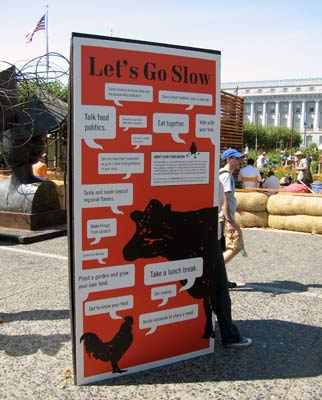Can America Be a Slow Food Nation?
A Report from Last Weekend's Sustainable Eating Conference in San Francisco

Bologna, bread, and cabbage. Doesn’t sound like much, but that’s because we’ve come to expect so little from our food: Food is fuel, time is money.
But as one author recently said, the revolution will not be microwaved – for that bologna can be artisanal mortadella from Berkeley’s Fra’ Mani Handcrafted Salumi, that bread can be the freshest sourdough rye, and that cabbage can be sauerkraut made the old way by Alexander Valley Gourmet, salt-cured and pressed in a clay pot. Add these three simple ingredients up, and you get culinary nirvana. Although there was nothing tricked up about this open-faced sandwich at all, it and a lot of other honest food, and even more honest talk, were the stars of Slow Food Nation, a three-day festival held August 29-September 1 that urged everyone to vote with their forks and think with their stomachs.
Of course, such an event could only be held in San Francisco, the city that’s ever-poised to drag the U.S. into the future. It doesn’t hurt that S.F. is already the center of a vibrant food culture, from the Ferry Building Market to fertile farms for miles around. Still, there was something a bit shocking to viewing the 10,000-square-foot Victory Garden – reportedly cranking out 100 pounds of produce a day for homeless shelters – rising out of the plaza across from City Hall. Seeing that noble dome over the cornstalks suggested we need to do some rethinking, for, as Saveur editor James Oseland pointed out, “One hundred years ago, the American farm system was, by and large, local. Now, there are five million fewer farms than in the 1930s, and, of the remaining two million, only about half are not corporately owned.”
Slow Food Nation, an outgrowth of the original Slow Food movement begun by Carlo Petrini in Italy in 1986, wants to reconnect us to our, er, roots. Slow Food Nation’s executive director Anya Fernald explained, “We want to create a moment of celebration and joy suffused with a mandate for political change that leaves people with more knowledge of the simple changes they can make to build a sustainable food system for America.”
At one panel, noted author Michael Pollan (In Defense of Food) took that idea further when asked where the presidential candidates stood on these issues. “They don’t stand,” he answered. “There’s too much pressure to bear and the nomination process begins in this state called Iowa. But in their effort to deal with climate change, with the problems of increasing health care costs, with the energy crisis, they will have to deal with food issues.” Pollan wasn’t the only luminary on hand, of course. Panels featured the likes of Eric Schlosser, Vandana Shiva, Winona LaDuke, Marion Nestle, Carl Pope, Wendell Berry, and Petrini himself, giving attendees plenty of food for thought.
As for food for food’s sake, the event wasn’t shy about leading with its kitchen. Alongside the Victory Gardens and a bustling marketplace was the ultimate answer to Mickey D’s and the rest: Slow on the Go. These booths offered delectables from across the U.S., showing that there could be tasty food courts that don’t violate the laws of proper nourishment. For $5, you could savor a Tamale Yucatecos made of organic masa, Riverdog Farm Swiss chard, Early Girl tomato salsa, organic hardboiled egg, and pumpkin seed pesto from Primavera Tamales in Sonoma. So good, it could drive you to tell Taco Bell where to stuff its Chihuahua.
Indeed, this was a weekend starring first- and last-named foodstuffs that are proud of their hometowns. That’s a huge part of the Slow Food movement: getting away from the industrialized food system that dulls flavor, often harms health by cost-cutting, damages the soil, leaves crater-like carbon footprints, and makes food security very risky.
Fort Mason’s tasting pavilions offered a different view of the food world. Divided into 15 sub-categories, from cheese to charcuterie, beer to ice Cream, producers served such items as sausage and rapini pizza, bison chili, and small batch pickles. It was food about honesty, food with soul. That’s the wonderful thing about this movement-you can feel righteous without any suffering. What’s good, at last, is good for you (as long as you don’t sample too many of the 454 sustainable wines available for tasting).
Which gets us to the million dollar question: Is this “movement” just something for those of us already comfortable? After all, we live in a land where mentioning the word “arugula” gets one labeled fancy-pants. Yes, the panels and pavilions mostly served the seemingly well-to-do who were eager to get the latest tips from an Alice Waters, a Charlie Trotter, or a Traci des Jardins, all chefs who offered quick classes in the Green Kitchen hosted by Davia Nelson from NPR’s Kitchen Sisters.
After all, if we save the planet, we take everyone with us: insisting we fight the fight for better public school meals, suggesting we have a national holiday not just for the solider but the farmer, and proposing that food stamps are valued at $1.50 to the dollar at farmers markets. Going as far as LaDuke suggested, “Perhaps it’s time to decouple the food system from the cash economy.” These ideas suggest that someday we can sweep away Flamin’ Hot Cheetos and replace them with Cowgirl Creamery’s Red Hawk cheese or Frog Hollow Farm’s peaches.
Perhaps the very idea that slow food is elitist is elitist itself.
4•1•1
See slowfoodnation.org.



